“Never leave it in the hands of the judges” is the line used by UFC president Dana White, and it’s been immortalized by being printed above the locker room doors in the gym used to tape The Ultimate Fighter. But unfortunately, at the top level, it isn’t always that easy to ensure a finish in a mixed martial arts bout.
UFC fighters should be able to leave a fight in the hands of the judges and trust them to reach the correct decision, but that simply hasn’t been the case over the 25-year history of the promotion. Bad decisions have been made during both the current 10-point must system era and the era before – which saw the judges simply decide a winner based on the fight as a whole.
Sometimes it’s all too easy for fans of a certain fighter to cry “bad decision” after a loss, but in the following 10 cases, the wrong man certainly had his hand raised. Here are the 10 worst robberies in UFC history.
Get the latest updates on One Championship Rankings at Sportskeeda and more
#10 Demetrious Johnson vs. Ian McCall, UFC on FX 2 – March 2nd, 2012
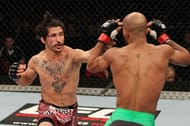
The UFC introduced the Flyweight division in 2012 with a pair of fights to decide who would compete for the inaugural UFC title later in the year, and one of them ended pretty decisively – Joseph Benavidez knocked out Yasuhiro Urushitani. The other – between future champion Demetrious Johnson and then-top-ranked 125 pounder Ian McCall - unfortunately proved to be one of the most controversial decisions of all time.
The first and second rounds were basically too tight to call, with both men scoring with impressive takedowns and landing fairly evenly in the striking department. The general consensus seemed to be Round One for McCall, Round Two for Johnson. The third round, however, was simple – McCall absolutely dominated Johnson, eventually finding himself in the back mount position, where he rained down hard shots that could’ve seen the fight stopped.
The round probably should’ve constituted a 10-8 for McCall, giving him a 29-27 win or a 29-28 win if it was a 10-9. However, two of the judges somehow scored the fight 29-28 for Johnson, giving him an apparent split decision victory.
If that wasn’t bad enough, when the scorecards were later checked it turned out someone’s math had been bad, as while one judge had indeed gone 29-28 for Johnson, the other two had gone 29-29 and 28-28 respectively, meaning it was a majority draw. And by the rules of the Flyweight tournament, the fight should’ve gone to an overtime round – which McCall would’ve had a huge advantage in.
Instead, the UFC were forced to re-do the fight three months later, and Johnson made the better adjustments and picked up a clear-cut win. McCall’s UFC career was never the same afterwards, and the whole thing left a sour taste – imagine how different the Flyweight division could’ve been had the judges made the right call?
#9 Michael Bisping vs. Matt Hamill, UFC 75 – September 8th, 2007

Some fans would probably have this one higher on the list, but after a rewatch I maintain that while the decision was horribly wrong, it wasn’t the worst robbery in UFC history as many in 2007 claimed – partly because it’s since been surpassed and partly because that opinion was formed due to a backlash against the UFC’s treatment of Bisping at the time.
Regardless though, it remains a bad decision. Fans going in figured that Bisping would have an advantage standing while his TUF rival Hamill would be favoured if the fight went to the ground, but surprisingly, Hamill showed much improved striking and largely beat Bisping to the punch – along with outwrestling him – throughout the first two rounds, hurting him particularly badly with a heavy right hand in the early moments of the first.
The wrestler did slow down a lot in the third round and that allowed Bisping to implement his trademark volume striking, but realistically he never had Hamill hurt or on the verge of being finished, and the fight looked like a clear-cut 29-28 win for ‘The Hammer’. But two of the three judges went the other way, siding with the British fighter, and immediately cries of robbery went out.
Some fans even accused the judges of being biased due to the fight taking place in Bisping’s UK backyard, but that was ridiculous – the lone British judge was the man who actually scored the fight 29-28 for Hamill! Basically, there was no bias involved – it was just bad judging, an unfortunate case of the judges favoring Bisping’s busier nature over Hamill’s far more effective gameplan.
#8 Georges St-Pierre vs. Johny Hendricks, UFC 167 – November 16th, 2013
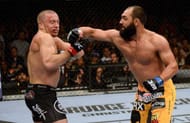
There was a lot of controversy around longtime UFC Welterweight champ Georges St-Pierre going into his 9th title defense against Johny Hendricks at UFC 167, with rumors swirling about a possible retirement, but when the fight was said and done, things only got worse for ‘Rush’. He held onto his title with a split decision win that most fans thought should’ve gone the other way.
Hendricks started off badly, almost being caught in an early guillotine choke by GSP, but then recovered to take the first round with some excellent takedown defense and some hard elbows and punches from the clinch. The second round also went firmly to Hendricks, who rocked St-Pierre on numerous occasions and had him badly hurt, while GSP’s strikes seemed to be doing nothing at all to the challenger.
GSP did do enough to win both the third and fifth rounds – the third saw him finally use his striking to back Hendricks up, while the fifth saw him outgrapple the challenger seemingly by sheer willpower alone. But those rounds sandwiched a terrible fourth for him, in which he slipped to his back and had Hendricks on top in guard, dominating with ground-and-pound.
It seemed like the only possible decision was 48-47 for Hendricks, but despite one judge going that way, the other two went 48-47 and St-Pierre retained his title before taking an extended leave of absence. The decision not only angered the fans but also UFC President Dana White, who was furious with GSP’s decision to walk away without offering Hendricks a rematch.
In hindsight, it could be argued that Hendricks attempted to coast the fifth round and thus threw the fight away, but realistically there’s no way he should ever have lost the decision anyway after such a performance. It was one he could never quite live up to too, as after winning the vacant title five months later, he failed to defend it and has since lost 6 of his 8 subsequent fights.
#7 Lyoto Machida vs. Mauricio Rua, UFC 104 – October 24th, 2009
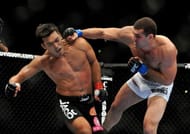
Going into UFC 104 all of the hype was on Lyoto Machida, who had been crowned UFC Light-Heavyweight champion five months prior. At that point, nobody had been able to figure out his karate-based style, and he was massively favored to beat former PRIDE champion ‘Shogun’ Rua, who had basically been given a title shot based on his reputation and a win over a much-diminished Chuck Liddell.
As Shogun hadn’t shown anything close to his PRIDE form in the UFC, most fans were expecting a Machida whitewash. Instead they were stunned as Rua apparently cracked the code and found a way to hurt ‘The Dragon’; rather than attempt to hit him in the face, he instead focused all of his attacks on the body and legs, both hurting Machida and also hampering his movement – the biggest reason for all of his success.
Both men took some hard shots in what turned out to be a great fight, but when all was said and done it appeared that Shogun’s body and leg work would be enough to win – most viewers gave him the first, second, fourth and fifth rounds. But the judges went the other way and unanimously scored the contest 48-47 for Machida. Even the initially pro-Lyoto crowd was horrified at the announcement, showering the cage with boos and chanting for Shogun.
Controversy followed the decision too when judge Cecil Peoples tried to argue that “leg kicks don’t win fights”, despite the fact that two UFC fights had been stopped by TKO due to that very attack in the 12 months prior to UFC 104.
Thankfully UFC president Dana White agreed with the fans and an immediate rematch was booked, and Shogun made good of the whole debacle by knocking Machida out in the first round to finally claim the title he should’ve won seven months prior.
#6 BJ Penn vs. Caol Uno, UFC 41 – February 28th, 2003
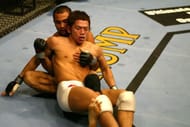
It was the decision that practically killed the UFC Lightweight division for almost two years. Eighteen months after the judges failed to recognize that BJ Penn had clearly outpointed Caol Uno for the vacant 155lbs title at UFC 41, the division was put on ice until March 2006, and a new champion wasn’t crowned until that October.
Penn and Uno had beaten Matt Serra and Din Thomas respectively to earn the right to fight for the title vacated by champion Jens Pulver, but as they’d already faced off once before – Penn knocking Uno out in seconds – the Hawaiian was the clear favorite coming in. And the fight appeared to play out that way too.
‘The Prodigy’ took Uno’s back in the first, third, fourth and fifth rounds and largely dominated proceedings every time the fight hit the ground. And he also seemed to get the better of the striking exchanges too, bloodying the Japanese fighter up throughout the contest. Uno perhaps took the second round with a couple of strong takedowns, but at best he should’ve lost a 49-46 decision.
Instead, the judges inexplicably scored the fight a split draw – one judge going 48-46 for Penn, one 48-47 for Uno and the third 48-48. Quite how they reached those scores remains a mystery to anyone who’s watched the fight, as Penn clearly warranted a victory. Instead, the title remained on ice and Penn ended up moving to 170lbs for his next fight. It was a bizarre call that makes no more sense over a decade on.
#5 Nik Lentz vs. Tyson Griffin, UFC 123 – November 20th, 2010
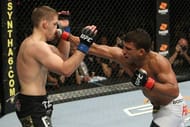
After a dull decision win over Andre Winner at UFC 118 that garnered serious hate from the fans, the word on the rumor mill was that the UFC would set wrestler Nik Lentz up with a nightmare opponent in his next fight. That turned out to be true, as they matched him with top ten ranked Tyson Griffin – a seemingly stronger wrestler with far superior stand-up, too. Griffin had lost his last two fights, and this was his chance to regain some momentum.
It was pretty clear to most viewers that across all three rounds, Griffin did just that. Sure, Lentz managed to secure some takedowns, but he also succumbed to more from Griffin, including some powerful slams in the early going. Griffin also got the better of the striking exchanges and even had Lentz in deep trouble in the third round, knocking him down twice with right hands. Most observers scored the fight 30-27 for Griffin and indeed, no other score seemed possible.
Except somehow, it was possible. While one judge scored the fight correctly, awarding Griffin a 30-27 win, the other two both saw it 29-28 for Lentz, and so he somehow escaped with a victory, despite doing very little to have earned it.
The bad decision was widely forgotten as it was the opener of the prelim card back in the days before every fight on each UFC show was televised, but viewers who have stumbled upon the fight on UFC Fight Pass in subsequent years would probably still be confused by how the judges saw things. It was a call that simply didn’t make sense by anyone’s standards.
#4 Bas Rutten vs. Kevin Randleman, UFC 20 – May 7th, 1999
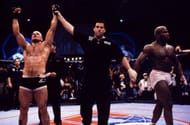
Despite almost two decades and over 400 UFC events taking place since, the 1999 fight between Bas Rutten and Kevin Randleman for the vacant UFC Heavyweight title remains one of the most controversial in MMA history, with the majority of people who’ve seen it coming to the same conclusion – Randleman was robbed of a victory by the judges.
This was, of course, a different era in the UFC, and neither five-minute rounds nor the ten-point must scoring system were in effect. Instead, the fight was scheduled for an initial fifteen-minute round, with two three-minute overtime periods if needed, and the three judges would score the fight as a whole.
The fight was built as a battle between a classic striker (Rutten) and a classic wrestler (Randleman) although of course, both men had shown their skills in other areas too. But on this night it seemed that Randleman’s powerful takedowns would win out. Rutten simply had no answer to them and was unable to stop Randleman from pinning him to the ground, and while there, ‘The Monster’ put a beating on the Dutchman for the majority of the fight.
Rutten came away with cuts under both eyes and a badly broken nose, while Randleman seemed largely unscathed outside of a couple of cuts on his scalp, opened by elbows landed by Rutten from the bottom position of the guard. But somehow the judges saw that work from the bottom – as well as a body kick in the second overtime period – as being enough to award Rutten the victory and title.
Accusations of the fight being fixed somehow still remain to this day – the feeling from that camp is that UFC’s parent company SEG had put all their promotional muscle behind Rutten and felt that he needed to win no matter what – but in reality it was probably a very early case of completely incompetent judges – something that foreshadowed some of the incidents we’d see during later UFC events.
#3 Tyron Woodley vs. Jake Shields, UFC 161 – June 15th, 2013
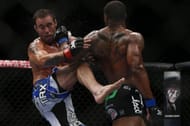
Current UFC Welterweight champion Tyron Woodley might have a bit of a reputation with the fans as a dull fighter to watch, but back in 2013 he was involved in a boring fight that was not his fault in any way. The fight in question – a split decision loss to Jake Shields – also remains one of the worst robberies in UFC history.
Woodley was coming off his UFC debut – a knockout of Jay Hieron – and the feeling was that he had the style to beat Shields – a stronger wrestling base and a far superior stand-up game too. Shields had traditionally struggled to defeat opponents he was unable to take down, and Woodley fit that mold down to a tee.
Indeed, Shields never came close to putting ‘The Chosen One’ on his back, and although he did manage to gain some clinch control and landed numerous glancing strikes on the future champion, he was also dropped in the first round by a heavy leg kick, and stunned badly in the third round by a spinning backfist.
Admittedly, Woodley didn’t exactly throw strikes with a lot of volume, but when he did land he clearly made more impact than Shields, and with all other things – i.e. the clinching, of which there was a lot – seeming equal, the decision should’ve gone to Woodley by a score of 30-27.
Instead, two of the judges went 29-28 for Shields, tipping the scales in his favor with the lone dissenter going 30-27 for Woodley. It was a totally unearned decision for Shields, while Woodley was clearly robbed of his first victory over a true top-ranked Welterweight contender. Due to its dull nature, the fight has largely been forgotten since, but it remains a truly baffling decision.
#2 Sean Sherk vs. Evan Dunham, UFC 119 – September 25th, 2010
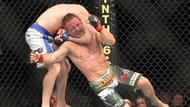
It isn’t very often that a fighter comes close to finishing their opponent with both strikes and submission attempts and still manages to lose the decision, but that’s exactly what happened to Evan Dunham when he fought former UFC Lightweight champion Sean Sherk at UFC 119 in September 2010.
Dunham was coming into the fight off the back of 11 straight wins, 4 in the UFC, and it looked like he’d follow it up with his 12th when he caught Sherk in a tight guillotine choke in the first round. Even commentator Mike Goldberg figured he’d won as he began to yell his trademark “IT IS ALL OVER” line before Sherk – turning purple – somehow escaped and then sliced Dunham open with an elbow, causing blood to spurt from a nasty cut.
The elbow could’ve been seen to have won Sherk the round, but the second and third clearly went to Dunham – he came close to choking Sherk out in the second with another two guillotine chokes, and then almost had the former champ knocked out in the third with a nasty high kick. At worst it should’ve been a 29-28 victory for Dunham, but instead, two of the judges saw it as a 29-28 win for Sherk, disgusting the crowd.
Thankfully the UFC appeared to recognize that Dunham had been robbed and treated him as if he’d won the fight, as he was given the main event slot against Melvin Guillard in his next fight. Sherk meanwhile retired in 2013 after a myriad of injuries, and never fought again – meaning he ended his career with a win rather than the loss he probably should’ve received.
#1 Randy Couture vs. Brandon Vera, UFC 105 – November 7th, 2009
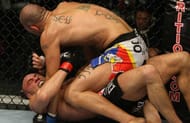
Sometimes a decision is so bad that it can turn a crowd against a fighter who they were initially completely behind, and that was certainly the case with the decision that I feel is almost certainly the worst in UFC history. The fight in question? The 2009 clash between former UFC Heavyweight and Light-Heavyweight champion Randy Couture and once-top prospect Brandon Vera in Manchester, England.
When the fight was announced as the main event of UFC 105, it was clear that to most fans at least, the main drawing card was Couture. He’d always been pushed as a cult hero by the UFC and while he’d fallen off the top of the mountain with losses to Brock Lesnar and Antonio Rodrigo Nogueira, he was still the betting favourite to beat Vera, who had never quite lived up to the early potential he showed in his early UFC career.
But Vera had an ace up his sleeve – despite most analysts giving Couture a grappling advantage, Vera actually had a sneakily underrated clinch game, honed during his earlier days at the USA’s Olympic Training Centre as a Greco-Roman wrestler. And so when Couture came in looking to impose his usual gameplan of dirty boxing from the clinch and takedowns, ‘The Truth’ was ready for him.
The first round probably went to Couture, as he was the more aggressive of the two although the clinch exchanges were largely even. But the second round saw Vera dominate, shrugging off Couture’s clinch attacks before dropping him with kicks and knees to the body. The third round followed a similar pattern, and this time it was Vera who secured a takedown, moving into a dominant mount position to apparently cement his victory.
Only when the judges’ scores were read as a unanimous 29-28, it was somehow in favor of Couture, not Vera. Despite chanting for Couture in the early stages of the fight, the British fans showered the cage with boos, recognizing an awful robbery, as Vera simply slumped on the steps leading up to the Octagon, shaking his head in disbelief.
It remains the worst decision I can recall in the UFC simply because, in some of the other bad calls, the winning fighter at least did some damage – in this fight, it appeared that the judges had given Couture the win simply due to his ability to secure a largely neutral position – the clinch. It was baffling at the time and it remains baffling today.
